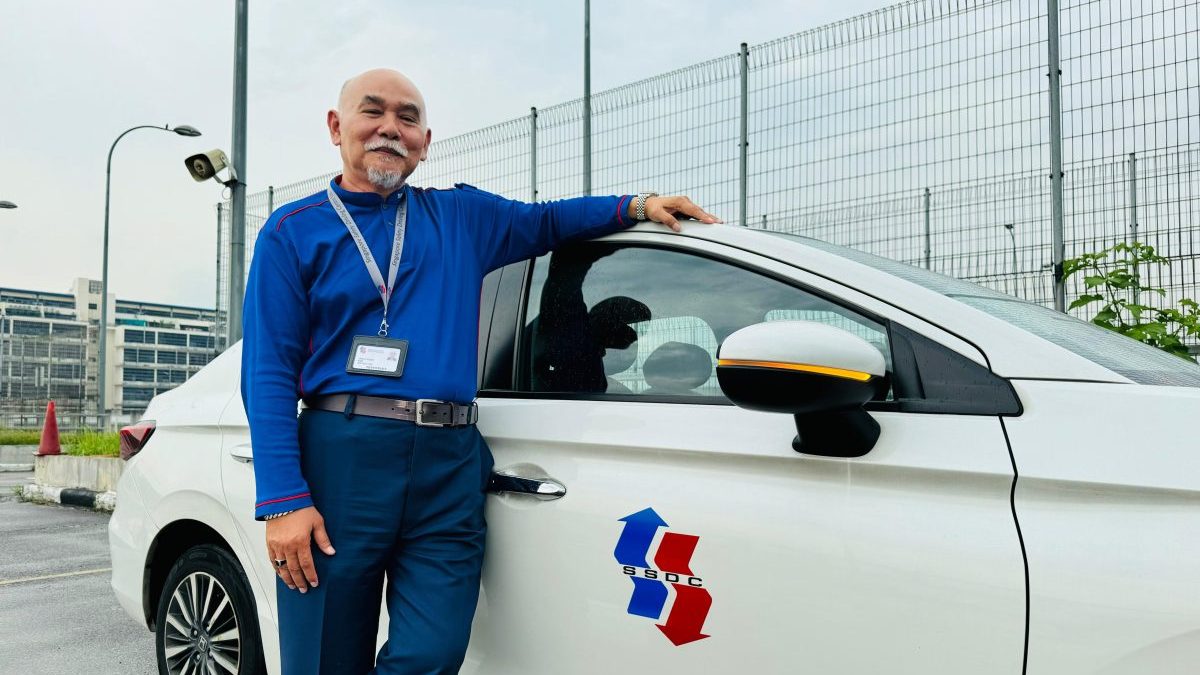Jamal Abdulnasir Mohamed Kasbi is one of those people you could have a conversation with all day.
Friendly and cheerful, with a smile that lights up any room he enters, he’s like the long-lost friend or brother you haven’t seen for ages.
Decked in his smart neon blue Singapore Safety Driving Centre (SSDC) driving instructor uniform, happiness and contentment radiated across his face — it’s a sign of a truly happy worker.
“I like my job because I meet people like doctors, lawyers, engineers, and air stewardesses. I’ve even taught [former Singapore President] Tony Tan’s son before!
“I also enjoy teaching, and my passion is driving. I was also into racing cars and motorbikes in my younger days,” said the senior driving instructor, who recently received the NTUC May Day Model Worker Award.

Work-Life Balance Initiatives
Jamal is not only happy because he loves his job; SSDC has also been treating him well.
The company, a recipient of the NTUC May Day Plaque of Commendation Award, offers a family bonding allowance of $350 per employee annually to incentivise workers to strengthen family bonds through family vacations.
In the 29 years Jamal has been with the company, he has used the allowance almost every year on family trips.
“We go for a holiday every year, and I look forward to it. The [incentive] makes staff want to go for a holiday, and everybody’s taking it,” he said.
SSDC General Manager Timothy Tham added: “We also observe a very good retention rate with this family bonding incentive.
Mr Tham said that the company also organises mindfulness workshops for their employees.
“We hope that with constant mindfulness, employees can foster resilience, creativity, and emotional regulation, leading to a happier and more fulfilling life,” he said.
Mr Tham said that the company plans to offer flexible work arrangements to all employees soon.
“We have instructors of different ages, and everybody has family commitments. A flexible arrangement is a win-win that will help them to settle their family commitments and continue to work [within] our company schedule.
“It is also less stressful for them to make other arrangements,” he explained.
Comprehensive Health Support
Mr Tham shared that SSDC also has a comprehensive suite of medical schemes to protect the health of its employees.
This includes dental care, critical illness and term life insurance, and private health insurance plan reimbursement.
Staff can also seek general medical attention from a panel of over 400 clinics and pay only 10 per cent of the total cost.
The extensive coverage is a big help to Jamal. The 66-year-old driving instructor has been fully claiming the medication costs for his chronic conditions and co-paying only 10 per cent of regular doctor visit costs, lessening his burden all these years.
Skills Upgrading Opportunities
As a forward-looking company, SSDC also believes in upskilling its driving instructors to improve their service culture and employability.
“I’m a strong believer in lifelong learning. Our staff need to learn and change their mindset on handling and managing customers from different age groups, cultures, and languages.
“We also support instructors who do not possess Class 2B licence to take up motorcycle [classes] fully sponsored by the company, so they can teach people how to drive motorcycles.
“A Class 2B [motorcycle] licence may be an added advantage to [the instructor’s] employability in the company or the transportation industry,” Mr Tham said.
While Jamal has no plans to get a motorcycle teaching license yet, he has participated in company-provided courses to learn how to communicate more effectively, guide students to improve passing rates and manage difficult students.
“I took the Go the Extra Mile course. When they say you go the extra mile, you don’t just stick to the syllabus.
“For example, I tell my students that when they pass, it is not the end of the driving story; it’s just the starting point.
“We tell them more about what to expect on the roads, not just teach them how to drive,” he shared.
He also leveraged technology to improve student engagement by providing updates on their learning progress and subsequent training plans, improving transparency and communication between instructor and student.
SSDC’s training plan is also evolving, catering to the increasingly younger customer base.
To this end, SSDC is working with the Singapore Industrial and Services Employees’ Union (SISEU) and NTUC LearningHub (NTUC LHUB) to customise courses to equip driving instructors with new skills to handle younger students more effectively.
“Customer service and interpersonal skills are important. We’re also talking about EQ [emotional intelligence] skills, like how you manage your customers, how you interact with your customers,”
Mr Tham elaborated.
These tailored courses will be conducted on-site to train instructors without affecting the driving school’s business operations.

